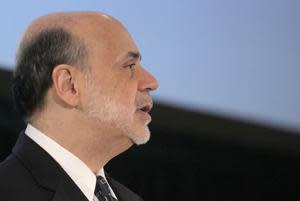 The Lookout
The LookoutUnderwhelming response to Fed’s ‘Operation Twist’

So what are people saying about "Operation Twist," the Federal Reserve's just-announced plan to buy $400 billion worth of long-term government bonds? Is it likely to succeed in encouraging borrowing and jolting the economy out of its rut? So far, the reviews aren't resoundingly positive.
• Dan Gross of Yahoo! Finance is underwhelmed. "This move is better than doing nothing," he writes. "But there's no reason to think it will make the difference between unsatisfying and satisfying growth." Why? In part, Gross argues that the bond purchases will be a holding maneuver because the market had been anticipating the move for a while, so interest rates on 10-year bonds had already fallen. In addition, borrowing costs are already so low that it's not likely to have a huge impact. "Money simply can't get much cheaper," he writes.
• Neil Irwin of the Washington Post notes that the Fed appears to be focused specifically on lowering already-low home-loan rates, in an effort to give the struggling housing sector a lift. "Between the bigger-than-expected twist and reinvestment in [mortgage-backed securities]," he tweets, "this FOMC seems to be aiming straight at mortgage rates."
• Bruce Bartlett, a former Treasury official from the George H.W. Bush administration, suggested that yesterday's controversial effort by Republican congressional leaders to pressure the traditionally independent Fed not to act may have had the opposite of its intended effect.
"Historically, one of the main things that has held back politicians from publicly criticizing the Fed is that it can easily backfire and encourage it to do the opposite of what they want it to do," Bartlett wrote in an email to the New York Times. "Certainly there have been many times in the 80s and 90s when administrations wanted an easier monetary policy. But they knew that the Fed jealously guards its independence and cannot allow itself to be seen as caving to administration pressure. Therefore, administration pressure to ease would force the Fed to remain tight lest it appear that it was caving to pressure."
• Justin Wolfers, an economist at the Wharton School of Business, faults the Fed's communications skills. "People don't care whether their mortgage rates are lower b/c of $400b or $400m," he tweets. "Tell 'em what you'll do to rates, not how you'll do it." In other words, Wolfers wants a statement more focused on the expected impact of the move--lower borrowing costs and mortgage rates--than on the nitty-gritty of the financial engineering designed to achieve it.
• As for Newt Gingrich, he's not happy that the Fed is doing anything at all to bring down unemployment. "Fed Reserve should not be making economic policy," the GOP presidential candidate tweets. "As Pres., I'll work to return Fed to focusing solely on stable prices and low inflation."
• Investors don't appear too happy either. The markets fell across the board in the minutes after the Fed's announcement.

